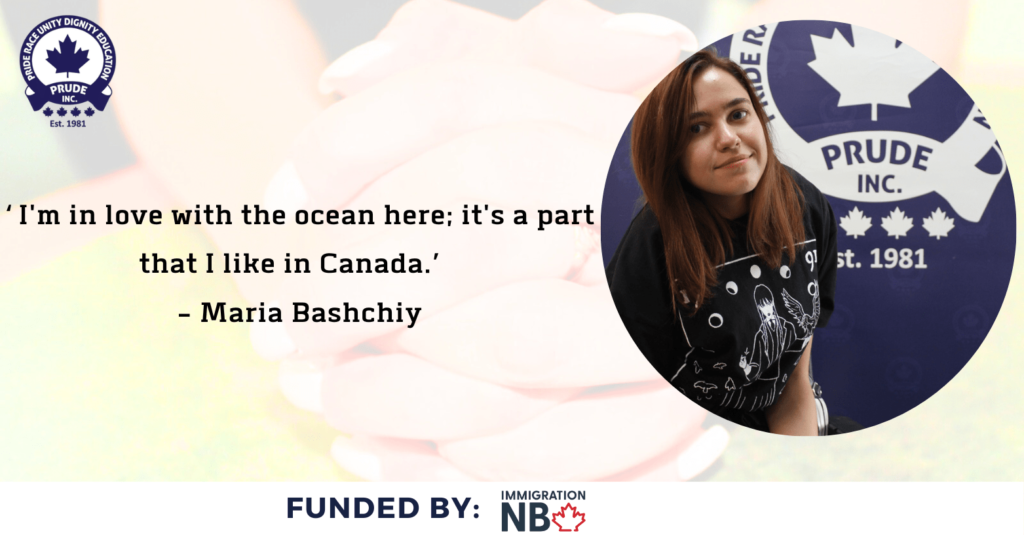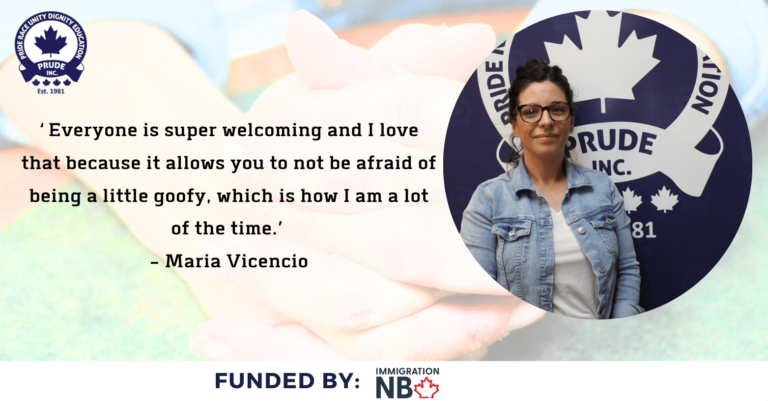Maria Bashchiy: Getting through as a family
by Winluck Wong
This article is part of PRUDE Inc.’s “Living Library” project, featuring Saint John’s newcomers and the diverse stories they bring to the city. It is funded by Immigration New Brunswick.
Without hesitation, Maria Bashchiy would call herself an extrovert. “I like to meet people,” she said. “I like to speak with them, [I] like to joke with them.” And she strives to experience something new every day. Her ideal job would be one that offers variety as well as opportunity to interact with people.
Daily life under siege
Maria worked as a social media manager for different stores selling beauty products on the Prom.ua digital marketplace in Ukraine. It gave her variety, but none of the opportunity for face-to-face interactions. Still, she felt it was a better fit than what she had gone to university for.
She was originally going to become an English teacher. But she quickly realized that she was more into learning the language itself than teaching it. Another issue was that her university was not built with accessibility in mind.
It was an old, Soviet-era building with massive stairs everywhere. And because she uses a wheelchair, it was tough getting to classes. “My class was always on the third floor,” she said, laughing. “If not the third, it was the fourth floor.” The university eventually clued in and made sure some of her classes were on the first floor. The rest of the classes she completed remotely from home.
At home, she is close with her younger sister and brother. The large age gap she has with her siblings has never been a barrier because she was often the one taking care of them while their parents were out working.
Both their parents worked long hours. Her mother was a concrete factory manager while her father was a truck driver. But when the Russo-Ukrainian War escalated, it hit her father’s livelihood especially hard.
That morning, he was supposed to start a long-haul to Kyiv. Just as he was about to leave, the first missiles struck the city. If the attack had started a few hours later, he would’ve driven right into the front lines. Thankfully, he was able to stay together with the family in their hometown of Stryi – slightly more secure in western Ukraine.
As battles raged, fuel shortages were on the rise. Long queues stretched from every gas station. Her father would sometimes have to wait in line for almost three hours, only to be allotted just 10 litres of gas. It wasn’t long before city-wide blackouts were rolled out.
Stryi itself had a blackout that lasted two months. “There wasn’t light in the street, there wasn’t light from windows,” she said. “Only lights [were] cars. And the government asked people to walk with the lights [of their] phones. For [drivers] to see people.”
Everyone’s phones also had air-raid alarm apps installed. And they went off constantly. Every time the alarms sounded, her whole family would rush down to the basement under their garage to wait for the all-clear signal.
Sheltering in place with her family, she noticed they each reacted differently. Her mother was in a perpetual state of panic while her father meticulously worried over every detail to keep the family and house safe.
As for Maria, she just didn’t want to do anything. She felt dragged down by an exhaustion that refused to go away. She would sleep for at least 12 hours a day and wake up to doom-scroll on her phone until she fell asleep again.
She couldn’t stop checking the latest news on what’s going on with the war and what’s happening to her friends. “A lot of our friends lost part of [their] family,” she said. “They lost houses. Just everything.”
Although life in Ukraine grew more dangerous with each passing day, her family had already written off the possibility of leaving the country. Because her father was just under 60 years old, he wasn’t allowed to leave while the general mobilisation to defend Ukraine was in effect.
Leaving without him was out of the question because their family has always stuck together. “We thought if the Russians will come, we will drive to another region,” she said. “Go somewhere where almost nobody is.”
And no matter what happens, they’ll figure something out – as a family.
A chance taken
In March 2022, the Canadian government provided temporary travel visas to Ukrainian nationals. With the program designed to allow for large families in need to apply together, it meant there was a chance that Maria’s entire family – including her father – could be approved to go.
They decided to take a chance. And if her father doesn’t get approved, well, they’ll cross that bridge when they get there. Because there’s an urgency now to leaving: her brother would be turning 18 soon. They have to get out before he was also eligible to be drafted.
It took many trials to put their applications together – including a side trip to Poland to process biometric data – but they finally submitted them in full. And they got approved. The entire family could now head to a safe haven together.
They also knew exactly where in Canada they wanted to go: New Brunswick.
In fact, they knew as far back as 2021 because her brother had already applied to study at New Brunswick Community College (NBCC) and had been accepted. But complications with the move delayed things and then the arrival of war completely shut the rest of the process down.
They would soon discover more ripple effects from the war as they got closer and closer to moving.
The war caused problems with international money transfers to the point where her brother could not pay NBCC’s confirmation deposit fee, which cost him his seat in the program. NBCC had to make an exception for him in light of the technical issues beyond his control. Then he spent days doing the English language exam – which usually takes about four hours – over and over because power outages from the war kept interrupting their internet service.
But it seemed like destiny was on their side. They got through each problem one by one.
On December 14, they landed in Saint John.
Generosity of strangers
Maria couldn’t take her eyes off the sea when she arrived. “It was something special for me,” she said. “I’m in love with the ocean here; it’s a part that I like in Canada.”
She was also struck by the generosity of the people here. And how willing they are to lend a hand to complete strangers. Their host, Pam, went above and beyond to help them get settled. She was somehow able to find them an apartment big enough for five people and a cat – in the middle of December. She even sourced some basic furniture and volunteers to move them in.
That Christmas, the whole family pitched in to help Pam bake cookies and put up decorations. Maria had a lot of fun because she liked the way Canadians go all out to deck the house, which wasn’t a common custom in her family. But that didn’t stop her from trying every year though. “In Ukraine, I was the one who did the Christmas tree and surrounded [everyone] with Christmas stuff,” she said, laughing. “I was annoying everyone with this.”
In the new year, the family focused on building a new life here. Her brother got ready for college. Her father got a job right in his field as a truck driver for Shoreland Transport.
And Maria got back into social media management by working with WE Believe. But this time, she gets to meet people as well when she works at the local charity events she helps to promote. She also wants to get her driver’s licence and buy a car one day so she could have the freedom to travel.
Beyond that, she’s open to what the future brings. “[With] the war,” she said. “I think I [learned] to enjoy these days and not [think] about what will be next.”
Winluck Wong is a freelance writer heating up ideas and hammering them into stories. Some even have a shape. Visit his shop for more!




